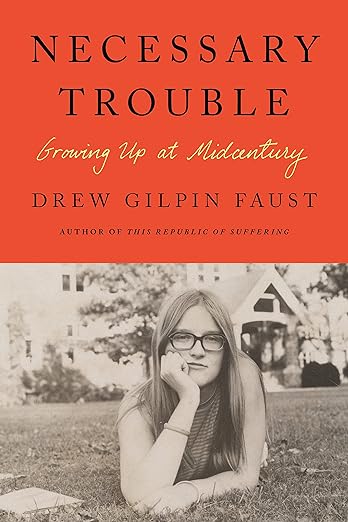
You may recognize the title of this book as part of a quote from the incomparable Civil Rights activist John Lewis. The phrase refers to the important work of upending racial discrimination. Lewis practiced raising “necessary trouble” all his life. He was an active force in the Civil Rights movement beginning in the 1960s and served in Congress from 1965 to his death in 2020.
“Thank you for getting into trouble, necessary trouble” is one of the epigraphs in Drew Gilpin Faust’s new memoir Necessary Trouble: Growing Up at Midcentury. It was Lewis’s comment to her on reading Faust’s memoir. She, too, participated in the Civil Rights movement and spent her adult life probing the events of the Civil War and its aftermath. She grew up in the horse country of northern Virginia in the 1950s, a rebellious daughter who disdained the Southern Belle upbringing her mother wanted for her. She was much more attracted to the free and independent life her brothers were allowed. But, “it’s a man’s world,” her mother always told her, “and you’d better get used to it.” She fought with her mother all her life over what was appropriate behavior. She writes that “…we never settled the larger part of the argument that was what we had instead of a relationship.” Necessary Trouble is a coming-of-age memoir from a time (the 1960s) when coming to maturity meant abandoning the mores and strictures of our mother’s lives and plunging headlong into another world.
At the age of nine, she wrote to President Eisenhower asking him to address the issue of equal rights for African-Americans. From an early age she disliked the inequality she saw growing up. A photocopy of her letter is on the opening pages of the book. She was lucky to attend schools that encouraged women and gave them the freedom to follow their interests and their passions.
During her college years at Bryn Mawr she spent the Freedom Summer of 1964 traveling in the South with other students; she skipped midterms to protest the Vietnam War; and she became a historian of the Civil War to understand the origins of U.S. racial justice issues. Faust and I are almost the same age so I enjoyed the chapters on the social history of the 1960s. They were such turbulent times! Her succinct and evocative description of what it was like to live through those times brought it all back for me. Faust brings her memoir up to the year 1968. There’s certainly more than enough to enjoy and think about in what she’s written but I suspect that at some point she’ll take us further. She was, after all, the first woman president of Harvard, from 2008 to 2018 and the author of several acclaimed books on the Civil War, including the outstanding This Republic of Suffering: Death and the American Civil War.
Several months ago I had the pleasure of hearing Faust speak about her life and her memoir to a full house at the incomparable Labyrinth Books in Princeton. She was interviewed by former Princeton president Shirley Tilghman, another brilliant, formidable woman. The room was full and there was a wonderful sense of ease between them, these women who had accomplished so much. There was no posturing, just a genuine sense that there was so much to be done and they were so glad that they had had a part in it.
